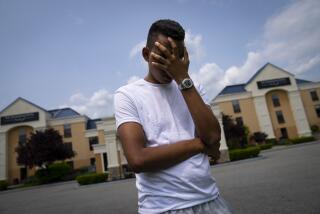Man Held (and Held) on Suspicion
- Share via
As far as federal authorities are concerned, it remains an open question whether Hady Hassan Omar Jr. is linked to terrorism.
The 22-year-old native of Egypt and aspiring antiques dealer was arrested the day after the Sept. 11 hijackings and sits in a maximum security prison north of New Orleans.
He is among the longest-held detainees picked up in the sweeps that followed the terrorist attacks. Omar’s case demonstrates the government’s determination to use all avenues to block the release of anyone about whom officials harbor doubts.
Omar, like many others, is jailed on unrelated immigration charges. No criminal charges have been filed.
But federal authorities are appealing to an immigration board in suburban Washington to deny Omar bond. The government contends he remains a danger to the community, even though he passed a polygraph test. “Compartmentalization of terrorist activity would mean that subject could pass polygraph,” states one confidential document in Omar’s case, meaning that plots might have been structured to keep participants in the dark on key aspects.
Friends and family of the former waiter at an Italian restaurant in Fort Smith, Ark., view him as a nice guy victimized by coincidence. “He loves America,” said his wife, Candy Kjosa, a native of Arkansas who has an infant daughter, Jasmine, with Omar.
But, from the standpoint of the FBI, Omar has at least three strikes against him: He is a young Arab man, he was a passenger on a commercial jet on Sept. 11 and, most crucially, he booked his plane reservation via the Internet at the same Kinko’s copy shop in south Florida that was used by suspected hijackers Mohamed Atta, also an Egyptian, and Ahmed Ibrahim A. Al Haznawi.
Omar insists he was not involved in the terrorist strike and didn’t know the hijackers. He has stuck to his story.
“When I first met him, I told him that if he wasn’t involved in this, all things being equal he was going to be all right,” said Omar’s attorney, Larry Fabacher, of New Orleans. “And I told him if he was involved in it, I hope he burned in hell. He said he wasn’t.”
The FBI placed Omar in custody on Sept. 12 after he returned to Arkansas following a stay in Florida, where, according to his wife, he was seeking to start a new life as an antiques dealer. He boarded a plane on Sept. 11 bound for Little Rock, via Houston. But he was stranded in Houston when all commercial flights were grounded after the attacks.
Candy Kjosa said she drove to Houston and returned to Arkansas with him the next day. An unmarked sedan with three FBI agents soon showed up and they were both arrested. The wife was released.
The government suffered a setback last month when an immigration judge called the Internet connection to the terrorists a “coincidence” and ordered Omar released on $5,000 bond, according to Fabacher. The judge ruled that Omar appears entitled to residence status. U.S. authorities challenged the release order before the Board of Immigration Appeals.
Authorities have hinted at other alleged violations that could be used to keep Omar in custody, said Fabacher, the attorney. It is a hardball tactic that has been employed in other cases.
“The government is just very reluctant to cut anybody loose,” Fabacher said. “Nobody wants to be the one to sign off and say, ‘This guy’s all right.’ They’re always afraid they’re going to go out and blow something up.”
More to Read
Sign up for Essential California
The most important California stories and recommendations in your inbox every morning.
You may occasionally receive promotional content from the Los Angeles Times.













